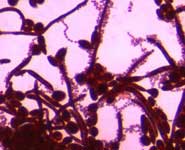Candida infections are becoming increasingly prevalent in hospital patients and the elderly, and are difficult to control effectively. About 50% of the adult population carry Candida yeasts in their mouths.
Research from the Oral Microbiology laboratories in Bristol has shown that Streptococcus bacteria present in saliva and on teeth and gums can stimulate Candida into becoming invasive. In addition to microbial genetic studies (involving collaboration with Dr Meg Vickerman, State University of New York at Buffalo), the research will include biophysical analyses of receptor-ligand interactions and application of clinically relevant models by Bristol co-investigators Dr Michele Barbour and Professor Daryll Jagger. Understanding the molecular interactions between Streptococcus and Candida may yield new targets for anti-fungal therapies.

